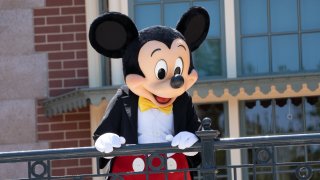
- Disney posted better-than-expected results on both the top and bottom line, bolstered by increased spending at its domestic theme parks.
- On Wednesday, the Walt Disney Company reported that total Disney+ subscriptions rose to 152.1 million during the fiscal third quarter, higher than the 147 million analysts had forecast.
If Disney+'s subscriber growth is any indication, the rumors that the global streaming market is nearing saturation have been proven untrue.
On Wednesday, the Walt Disney Company reported that total Disney+ subscriptions rose to 152.1 million during the fiscal third quarter, higher than the 147 million analysts had forecast, according to StreetAccount.
At the end of the fiscal third quarter, Hulu had 46.2 million subscribers and ESPN+ had 22.8 million. Combined, Hulu, ESPN+ and Disney+ have over 221 million streaming subscribers. Netflix, long the leader in the streaming space, had 220 million subscribers, according to the most recent tally.
Get Southern California news, weather forecasts and entertainment stories to your inbox. Sign up for NBC LA newsletters.
Disney shares rose more than 6% after the closing bell.
The streaming space has been in a state of upheaval in recent weeks, as Netflix disclosed another drop in subscribers and Warner Bros. Discovery announced a shift in content strategy. While Netflix expects subscriber growth to rebound, uncertainty has left analysts and investors wondering what the future holds for the wider industry.
Also Wednesday, the company unveiled a new pricing structure that incorporates an advertising-supported Disney+ as part of an effort to make its streaming business profitable.
Money Report
During the fiscal third quarter Disney+, Hulu and ESPN+ combined to lose $1.1 billion, reflecting the higher cost of content on the services. Disney's average revenue per user for Disney+ also decreased by 5% in the quarter in the U.S. and Canada due to more customers taking cheaper multiproduct offerings.
Starting Dec. 8 in the U.S., Disney+ with commercials will be $7.99 per month — currently the price of Disney+ without ads. The price of ad-free Disney+ will rise 38% to $10.99 — a $3 per month increase.
In addition, Disney lowered its 2024 forecast for Disney+ to 215 million to 245 million subscribers, down 15 million on both the low end and high end of the company's previous guidance.
Disney had previously set its Disney+ guidance in December 2020 at 230 million to 260 million by the end of fiscal 2024. The company reaffirmed its expectation that Disney+ will become profitable by the end of its fiscal 2024 year.
Overall, Disney posted better-than-expected earnings on both the top and bottom line, bolstered by increased spending at its domestic theme parks.
Here are the results:
- Earnings per share: $1.09 per share vs. 96 cents expected, according to a Refinitiv survey of analysts
- Revenue: $21.5 billions vs. $20.96 billion expected, according to Refinitiv
- Disney+ total subscriptions: 152.1 million vs 147.76 million expected, according to StreetAccount
Big quarter for parks
Disney's parks, experiences and products division saw revenue increase 72% to $7.4 billion during the quarter, up from $4.3 billion during the same period last year. The company said it saw increases in attendance, occupied room nights and cruise ship sailings.
It also touted that its new Genie+ and Lightning Lane products helped boost average per capita ticket revenue during the quarter. These new digital features were introduced to curate guest experience and allow parkgoers to bypass lines for major attractions.
The company said it has been able to bring back in-park experiences such as character meet-and-greets, theatrical performances and nighttime events at Disneyland, which has allowed it to increase capacity at its parks, CEO Bob Chapek said during the company's earnings call Wednesday. Disney has placed caps on attendance since it reopened after the initial round of pandemic closures in early 2020 and instituted a new online reservation system to control crowds.
"As it relates to demand, we have not yet seen demand abate at all and we still have many days when people cannot get reservations," Christine McCarthy, Disney's chief financial officer, said during the company's earnings call. "So, we're still seeing demand in excess of the reservations that we are making available for our guests."
Per capita spending at domestic parks increased 10% during the most recent quarter, compared to the same quarter last year and is more than 40% higher than fiscal 2019, the company said. Occupancy at domestic hotels in the third quarter was 90%.
Chapek pointed to EPCOT's new Guardians of the Galaxy Cosmic Rewind, the launch of the Disney Wish and the opening of Avenges Campus in Paris Disneyland as enhanced offerings for guests that have driven traffic and revenue to this division.
McCarthy noted that international visitors to domestic parks have continued to be slow to return. Traditionally, those parkgoers account for around 17% to 20% of total guests.
"We expect international visitation when its fully back to actually be additive to margins, because those guests tend to stay longer at the parks and they spend more money when they're there, as well," she said.
Disclosure: Comcast is the parent company of NBCUniversal and CNBC. Comcast owns a stake in Hulu.






